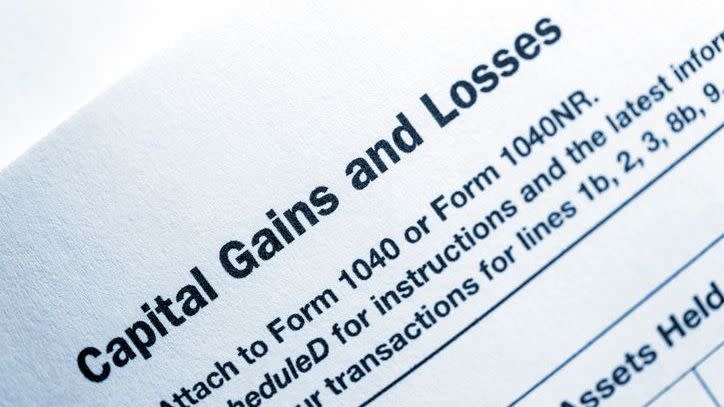What if a husband and wife own a home together that increases in value by $500,000. When one spouse dies and the other owns the property themselves, do they receive a step-up in basis? Or do they only receive a $250,000 capital gains exemption when they sell the property?
– Samuel
Your question deals with the rules surrounding both a step-up in basis of an inherited asset and the capital gain exclusion on the sale of a primary residence. These rules are independent of each other, so both are true: the surviving spouse receives a step-up in basis and they only receive a $250,000 exemption. That may sound a little confusing so let’s unpack it below.
If you have similar tax-planning questions or need help managing your investments, consider speaking with a financial advisor to see how they can help.
About the Step-Up in Basis
In finance, the term “basis” generally refers to the amount you pay for something. Basis matters because it’s the starting point from which you calculate taxable gains. For example, assume you buy something for $100,000 – that’s your basis. If the value of the asset grows to $150,000 and you decide to sell it, you’ll owe taxes on the $50,000 capital gain.
A step-up in basis occurs when the basis of an inherited asset is reset to its market value at the time the original (or co-owner’s) owner’s death. In other words, when a person inherits assets like stocks or real estate, the tax basis is adjusted to reflect the asset’s worth at the time of the owner’s passing, rather than the amount initially paid for it.
Returning to the example above, suppose you have an asset with a basis of $100,000, and by the time of your death, its value has increased to $150,000. Instead of inheriting your original basis, your heir receives a “stepped-up” basis. In this case, their new basis is $150,000, and they won’t realize a gain unless the property appreciates further.
(Accounting for the step-up in basis is an important component of tax planning and estate planning. A financial advisor with expertise in either area may be able to help you put this tax loophole to use.)
Capital Gains and the Sale of a Primary Residence

SmartAsset and Yahoo Finance LLC may earn commission or revenue through links in the content below.
The tax code allows you to reduce or avoid capital gains tax on the sale of a primary residence, provided that you’ve lived in it for two of the previous five years. This tax break is known as the Section 121 exclusion.
There are parameters you need to stay within to qualify for this tax break, but the broad strokes are as follows:
-
Individuals can exclude up to $250,000 of gains from the sale of a primary residence
-
Married couples that file a joint return can exclude up to $500,000 from the sale of a primary residence
So, assume the basis on your primary home is $300,000. If you’re single, you could sell it for up to $550,000 without incurring a capital gains tax obligation. A married couple could sell it for up to $750,00. This example ignores transaction costs to provide a simplified illustration. You’ll want to work closely with your tax professional to make sure you calculate your basis correctly. (And if you need help finding a financial professional, this free tool can connect you with you to three fiduciary advisors who serve your area.)
Combining the Two Rules
Samuel, to see how both rules apply in the situation you’re asking about, we need to think of them in order:
-
First, determine the stepped-up basis
-
Second, calculate the taxable gain considering the Section 121 exclusion
Step 1: Establish Basis
The surviving spouse receives a step-up in basis when the first spouse dies. However, the value of that adjustment depends on whether they live in a community property state. In a community property state, the surviving spouse receives a full step-up in basis. Meaning their basis becomes the fair market value of the asset at the time their spouse passed.
In a non-community property (common law) state, the surviving spouse only receives a step-up in basis for half of the property’s appreciation. For example, the couple’s joint basis is $300,000 but the home is worth $500,000 when the first spouse dies. Half of that $200,000 gain is added to the surviving spouse’s basis so they have a $400,000 basis on a home that’s worth $500,000.
Step 2: Calculate the Capital Gain and Apply the Exclusion
After the surviving spouse has determined the stepped-up basis of the inherited home, they can then calculate how much the taxable gain would be if they were to sell the property. And remember, they would only owe capital gains tax on the portion of that gain that exceeds the Section 121 exclusion.
Here’s a final example to tie it all together:
A couple that lives in a community property state owns a home that’s worth $500,000 after originally paying $300,000 for it. The first spouse dies and the surviving spouse’s tax basis is stepped up to $500,000. The surviving spouse can then sell the home for up to $750,000 without recognizing a taxable gain because of the $250,000 exclusion.
One last bit of nuance here: The exclusion amount depends on tax filing status. The “married filing jointly” status receives a $500,000 exclusion while “single” status receives a $250,000 exclusion. Widows and widowers are allowed to maintain their married filing jointly status in the year of death. So, the surviving spouse may still be able to exclude the full $500,000 if they sell the property in the same calendar year that their spouse dies. (But if you need additional help with your tax strategy, consider working with a financial advisor with tax expertise.)
Bottom Line


When one spouse dies and the surviving spouse decides what to do with their jointly owned home, it’s important to understand the rules for the stepped-up basis and capital gains tax exclusion. A surviving spouse will receive a step-up in basis that could adjust the inherited home to its fair market value at the time of their spouse’s death. If they were to sell it, they could still apply the Section 121 exclusion and avoid paying taxes on up to $250,000 in capital gains – and in some cases, $500,000 – on the home sale.
Tax Planning Tips
-
If possible, consider delaying the sale of appreciated investments until you’re in a lower income tax bracket, like after retirement. Long-term capital gains are taxed more favorably, and if your income is low enough, you may qualify for a 0% capital gains tax rate. To see how much you may owe when you sell your assets, try our capital gains tax calculator.
-
A financial advisor with tax planning and/or financial planning expertise can potentially help you determine the best time to sell assets to minimize the tax implications of the sale. Finding a financial advisor doesn’t have to be hard. SmartAsset’s free tool matches you with up to three vetted financial advisors who serve your area, and you can have a free introductory call with your advisor matches to decide which one you feel is right for you. If you’re ready to find an advisor who can help you achieve your financial goals, get started now.
Brandon Renfro, CFP®, is a SmartAsset financial planning columnist and answers reader questions on personal finance and tax topics. Got a question you’d like answered? Email AskAnAdvisor@smartasset.com and your question may be answered in a future column.
Please note that Brandon is not an employee of SmartAsset and is not a participant in SmartAsset AMP. He has been compensated for this article. Some reader-submitted questions are edited for clarity or brevity.
Photo credit: ©iStock.com/skhoward, ©iStock.com/LumiNola
The post Ask an Advisor: When My Spouse Dies, Do I Get a Full Step-Up in Basis on My Home or Only the $250k Capital Gains Exemption? appeared first on SmartReads by SmartAsset.
